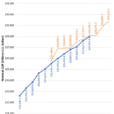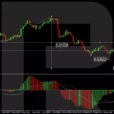eBay … $6 billion. Alphabet … $8.6 billion. Pepsi … $15 billion. Wells Fargo … $22.6 billion. Cisco … $25 billion. Apple … $60 billion.
Wage increases? Bonuses? Capital expenditure? Job creation?
Nope. Planned stock buybacks for 2018, fueled by the recent corporate tax cut.
Trump Administration and Congressional Republicans
So far in 2018, U.S. companies have announced more than $178 billion in planned buybacks. That’s the largest amount ever for a single quarter … up almost 80% year to date vs. 2017.
It wasn’t supposed to be this way.
The Trump administration and Congressional Republicans swore up, down and sideways that the tax cuts were going to produce wage increases, investment and jobs.

Uh-huh.
So far just 6% of the tax cut windfall has gone to pay hikes, almost all in the form of heavily-publicized one-off bonuses.
By contrast, announced stock buybacks exceed worker bonuses and raises by a factor of 63.
Stock buybacks are not a good thing. They distort the stock market. They encourage financial shenanigans and discourage investment. They weaken the economy.
Now this once-illegal activity is the single largest short-term driver of the stock market … a trap waiting for you.
Partying Like There’s No Tomorrow
Since 2008, U.S. companies have spent $5.1 trillion to buy back their own stock. That’s 54% of the profit of companies in the S&P 500 over the period.
There’s a strong argument that the recent performance of the post-2009 bull market has been based primarily on share buybacks, in two ways.
First, buybacks artificially reduce a company’s price-to-earnings (P/E) ratio, because reducing the number of shares outstanding increases apparent earnings per share (EPS). Issuing dividends rather than investing cash does the same thing.
In this way, companies can appear more profitable even if their actual profits aren’t growing. More than 40% of total EPS growth between 2009 and mid-2017 was based solely on share repurchases and dividends:











Leave A Comment